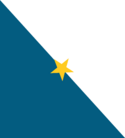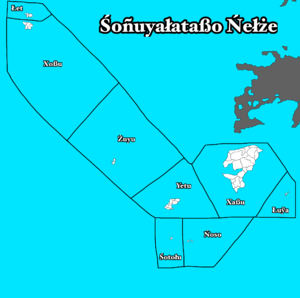Ngelthe
| Ngelthen State Łoña Ńelżen |
||||||
|---|---|---|---|---|---|---|
|
||||||
| Capital and largest city | Žoteł | |||||
| Official languages | Ngelthen | |||||
| Ethnic groups (2020) | 97% Ngelthen 3% Other |
|||||
| Demonym | Ngelthen | |||||
| Government | Unitary presidential republic | |||||
| - | President | Żoruq Ÿax | ||||
| Legislature | Ngelthen State House | |||||
| Population | ||||||
| - | 2024 estimate | 204,000 (116th) | ||||
| - | 2020 census | 201,321 | ||||
| GDP (PPP) | 2024 estimate | |||||
| - | Total | $50,100,000,000.00 | ||||
| - | Per capita | $25,000 | ||||
| Gini (2024) | 32 medium |
|||||
| HDI (2024) | 0.807 very high |
|||||
| Currency | Ngelthen Śox (ʄ) (NGL) | |||||
| Time zone | Ngelthe Standard Time (SCT-2) | |||||
Ngelthe (Ngelthe: Ńelże [ŋelðe]), officially the Ngelthen State, is an island country located in Soltenna.
Etymology
History
Early History
The islands that now comprise Ngelthe were inhabited since at least 2000 BCE, with archaeological evidence showing the original settlements on the islands were mostly small fishing villages sparsely dotting the coast. These settlements remained stagnant yet consistent throughout the years, and some still survive today. Żotel was founded during this period, and has a preserved section that is a major archeological site.
Kingdom of Ngelthe
In 1521, the Kingdom of Ngelthe was established. They were an enigma to most of the outside world, but they were also eager to reach out to it.
Revolution and Isolationism
In 1892, the kingdom was overthrown by rebels, and the Ngelthen Republic was established. The rebels were highly nationalistic and made the nation more isolationist as a result, putting many into poverty due to being unable to take imports.
Ńalże Regime
In 1954, Alołoża Ńalże was elected to the Ngelthen presidential office, however, once elected, he brutally ethnically cleansed all non-ethnic Ngelthens from Ngelthe by deporting or killing them. He also placed even more travel restrictions and sanctions upon other nations. He also dissolved the term limit for president and ruled for the rest of his life, not dying until 1994.
Ngelthen State
In 1994, upon the death of Ńalże, a new government was established during the ensuing power struggle, which came to be known as the Ngelthen State Government, and renamed the country to the Ngelthen State.
Geography
Ngelthe is made up of 11 main islands and numerous smaller ones.
Geology
Climate
South Xaßu and the rest of the southern islands have a Temperate oceanic (Cfb) climate, northern Xaßu and Żuyu have a Warm summer humid continental (Dfb) climate, and Xoßu and Łet have a Subarctic (Dfc) climate.
Biodiversity
Politics
Government
Ngelthe is a Unitary nonpartisan presidential republic.
Administrative divisions
Ngelthe is divided into 8 Island Provinces (Śoñuyałataßo), which can further be divided into 46 Communtities (Ñoyońuża).
| Name | Flag | Capital | Population (2020 Census) |
|---|---|---|---|
| Łet | Satańayu | 3,953 | |
| Łuÿa | Łay | 4,052 | |
| Ńoso | Ñosen | 2,182 | |
| Śotołu | Xoqaya | 1,722 | |
| Xaßu | Żoteł | 152,902 | |
| Xoßu | Vul | 5,223 | |
| Yetu | Axań | 32,662 | |
| Żuyu | Eqoña | 3,335 |
Foreign relations
Military
Economy
Transport
Ngelthe has a monorail system on Xaßu Island, and there is also a ferry network connecting every islands, along with airports on every island too.
Energy
Science and technology
Tourism
Demographics
Ethnic groups
Urbanisation
Ngelthe is a highly urbanized nation, with around half of the entire population living in the city limits of Żoteł.
Language
The predominant language is Ngelthen, spoken by around 98% of the population.


